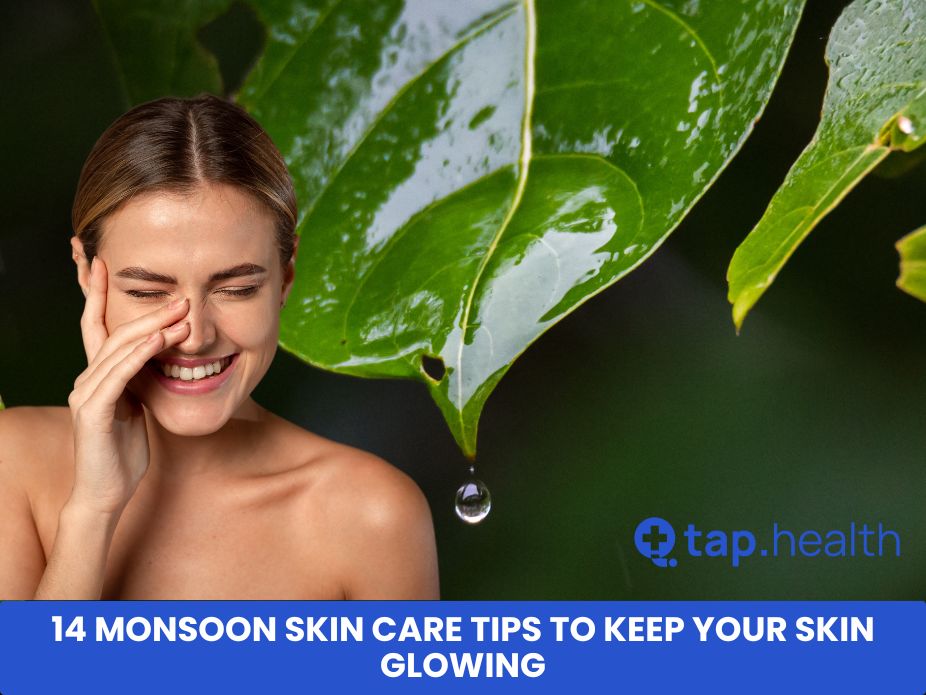The monsoon season brings refreshing rains but also challenges like humidity, oiliness, and skin infections. To maintain glowing, healthy skin, you need a tailored skincare routine. This blog shares 14 practical monsoon skin care tips, addressing common concerns like acne, fungal infections, and dryness. Whether you’re battling greasy skin or itchy rashes, these tips will help you achieve a radiant complexion.
Why Does Monsoon Affect Your Skin?
Monsoon weather, with its high humidity and dampness, can disrupt your skin’s balance. Here’s how:
- Excess Oil Production: Humidity triggers overactive oil glands, leading to greasy skin and clogged pores.
- Acne Breakouts: Sweat, oil, and dirt combine to cause pimples and blackheads.
- Fungal Infections: Damp conditions foster fungi, increasing the risk of ringworm or athlete’s foot.
- Dryness and Flakiness: Fluctuating weather can leave some skin types dry and scaly despite the moisture in the air.
Understanding these effects helps you adapt your skincare routine to combat monsoon challenges effectively.
How to Care for Your Skin During Monsoon
To keep your skin glowing during the rainy season, follow these expert-backed tips:
1. Cleanse Your Face Twice Daily
Why It Matters: Regular cleansing removes dirt, oil, and impurities that accumulate due to humidity. How to Do It: Use a gentle, soap-free cleanser twice a day to avoid stripping natural oils. Pat your skin dry with a soft towel to prevent irritation. Pro Tip: Avoid harsh soaps to maintain your skin’s moisture barrier.
2. Use an Alcohol-Free Toner
Why It Matters: Toners balance your skin’s pH and minimize pores, reducing oil buildup. How to Do It: Apply a toner with natural ingredients like rose water or witch hazel after cleansing to refresh and hydrate your skin. Pro Tip: Choose alcohol-free toners to prevent dryness and irritation.
3. Stay Hydrated
Why It Matters: Drinking enough water keeps your skin plump and flushes out toxins. How to Do It: Aim for 8-10 glasses of water daily and include water-rich foods like cucumbers and watermelon. Pro Tip: Limit caffeine and sugary drinks, as they can dehydrate your skin.
4. Eat a Nutrient-Rich Diet
Why It Matters: A balanced diet supports skin health by providing essential vitamins and antioxidants. How to Do It: Include fruits, vegetables, nuts, and omega-3-rich foods like fish or flaxseeds. Avoid junk food to prevent breakouts. Pro Tip: Berries and leafy greens are excellent for glowing skin.
5. Opt for Light Makeup
Why It Matters: Heavy makeup clogs pores, increasing the risk of acne in humid weather. How to Do It: Use non-comedogenic products like tinted moisturizers or BB creams. Remove makeup thoroughly before bed. Pro Tip: Minimal makeup lets your skin breathe and reduces irritation.
6. Apply Anti-Fungal Powder
Why It Matters: Fungal infections thrive in damp conditions, especially in sweaty areas. How to Do It: Use anti-fungal powders with clotrimazole or miconazole on areas like underarms and feet. Pro Tip: Apply after showering to keep skin dry and infection-free.
7. Keep Skin Dry
Why It Matters: Prolonged exposure to wet clothes can cause skin irritation and infections. How to Do It: Pat skin dry after getting wet and change into dry clothes immediately. Pro Tip: Focus on skin folds and areas prone to sweating for thorough drying.
8. Moisturize with Lightweight Products
Why It Matters: Even in humid weather, your skin needs hydration to stay soft and supple. How to Do It: Use a water-based moisturizer with ingredients like hyaluronic acid or glycerin. Pro Tip: Apply after cleansing to lock in moisture without greasiness.
9. Wear Breathable Fabrics
Why It Matters: Breathable materials reduce sweat and bacteria buildup, preventing irritation. How to Do It: Choose cotton or linen clothing over synthetic fabrics. Opt for loose fits to avoid chafing. Pro Tip: Breathable fabrics keep you comfortable and support skin health.
10. Avoid Touching Your Face
Why It Matters: Touching your face transfers dirt and bacteria, leading to breakouts. How to Do It: Keep hands clean with sanitizer and avoid unnecessary face contact. Pro Tip: Wash hands regularly to minimize germ transfer.
11. Incorporate Herbal Remedies
Why It Matters: Natural ingredients like neem and turmeric fight infections and soothe skin. How to Do It: Use neem-based face masks or turmeric-infused products to reduce acne and inflammation. Pro Tip: Homemade masks with these ingredients are gentle and effective.
12. Prioritize Sleep
Why It Matters: Sleep allows your skin to repair and produce collagen for elasticity. How to Do It: Aim for 7-8 hours of quality sleep with a consistent bedtime routine. Pro Tip: Lack of sleep can cause dullness and stress-related breakouts.
13. Exercise for Better Circulation
Why It Matters: Physical activity boosts blood flow, delivering nutrients to your skin. How to Do It: Engage in 30 minutes of exercise like yoga, walking, or jogging most days. Pro Tip: Exercise reduces stress, which can prevent acne flare-ups.
14. Consult a Dermatologist
Why It Matters: Persistent skin issues require professional diagnosis and treatment. How to Do It: Visit a dermatologist for tailored advice and product recommendations. Pro Tip: Regular check-ups help catch skin problems early.
Common Monsoon Skin Problems and Solutions
The rainy season can trigger specific skin issues. Here’s how to address them:
- Acne: Cleanse regularly, use non-comedogenic products, and avoid oily foods.
- Fungal Infections: Apply anti-fungal creams or powders and keep skin dry.
- Eczema: Moisturize frequently and use prescribed medicated creams.
- Prickly Heat: Stay cool and apply calamine lotion to soothe rashes.
FAQs on Monsoon Skin Care
1. How do I take care of my skin in the monsoon season?
Cleanse twice daily with a gentle cleanser, exfoliate weekly, stay hydrated, use a light moisturizer, and apply SPF 30+ sunscreen, even on cloudy days.
2. Why does my skin itch during the rainy season?
Itching is often caused by humidity-related fungal infections or allergies. Keep skin dry, use anti-fungal powders, and avoid wet clothes to reduce itchiness.
3. How can I stop monsoon-related skin itching?
Pat skin dry after rain exposure, apply anti-fungal powders, and use soothing moisturizers. Avoid staying in damp clothes to prevent irritation.
4. Why does my skin break out during monsoon?
Excess oil production, clogged pores, and humidity contribute to acne. Regular cleansing, toning, and lightweight, non-comedogenic products can help prevent breakouts.
Final Thoughts
Monsoon season can be tough on your skin, but with the right care, you can maintain a healthy, glowing complexion. By following these 14 monsoon skin care tips—ranging from cleansing and hydration to using breathable fabrics and consulting a dermatologist—you can tackle humidity, acne, and infections effectively. Stick to a consistent routine, prioritize hydration, and adapt your skincare to the rainy season’s challenges. Enjoy the rains while keeping your skin radiant and healthy!



